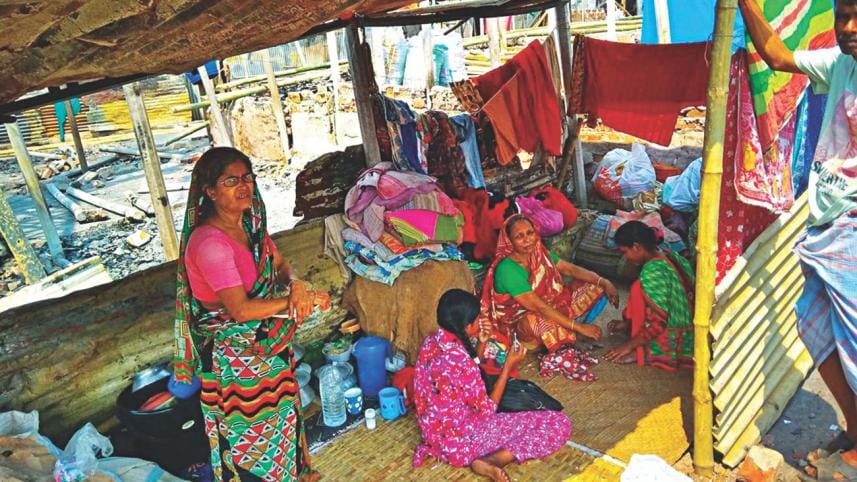No help for the helpless yet

Monowara Begum, 35, was doing well for herself. A resident of Elias Mollah Slum in the capital's Pallabi area, she had seven rooms to her name, using three to house her family and renting out the remainder.
On March 12, when a fire broke, the flames consumed not just her house but perhaps also her hopes and dreams.
“I need a minimum of Tk two lakhs to rebuild the seven rooms, but I don't even have the money to build one,” she said.
Today, Monowara lives with her family in a makeshift house. Her roof is an old tarpaulin which she got from a local mosque.
Monowara's tale is one of the many that can be found in the charred remains of 4,844 shanties, each housing a family, that were gutted in the fire.
The victims, mostly people from low income groups, including garment workers, rickshaw-pullers, small shopkeepers and housemaids, are yet to receive any financial help or support to rebuild their homes.
Most of the residents of Elias Mollah Slum, who lost their houses and valuables in the devastating fire on March 12 in Pallabi area, are still living under the open sky.
“The district administration has provided 30kgs rice per family,” Haji Razzab Hossain, the councillor of ward No 6 (Pallabi) told The Daily Star.
Locals said only one non-government organisation (NGO), Shakti, has given them some emergency utensils while some other NGOs collected the list of victims, but are yet to provide any support.
This correspondent repeatedly visited the spot for a week and talked with the victims of over 50 families.
Most of them said that they are not getting any financial support.
Monowara went to some people for loan, but didn't get anything. She is now struggling to bear the expenses of her three sons and a daughter. Her husband is a day-labourer who is also struggling to support the family.
Some of the worst suffers are also students who lost their books in the fire.
Local lawmaker Elias Uddin Mollah, MP of Dhaka-16 constituency, told The Daily Star that they have enlisted the names of victims from the 4,844 families who lost their homes on March 12 fire.
“We also provided study materials like books and uniform to 276 students,” he added.
The MP said some low income people settled in this locality some 30 years ago and they let them stay as the place is owned by his family members.
“[After the fire] we gave them shelter in a reconstructed building, provided them meals and gave them permission to build their house,” he added.

Locals said they are struggling to rebuild their houses as they don't have the money. Some have borrowed money or taken loans at high interest rates to build their homes.
Take the example of Selim Bepari, who had three rooms and a grocery shop in the slum-- all of which were gutted in the March 12 fire. He recently took a loan of Tk 30,000 at 10 percent interest rate and borrowed Tk 70,000 to build his houses.
Several hundred houses which were built on a wooden deck over water are costlier to build.
Marzina Begum, 50, who was a tenant of a room in such a house, said she is now living in her relatives' home as her house-owner hasn't assured her of rebuilding the house.
“The cost would be three times higher to build a house on water than on land. My house-owner doesn't have enough money,” she said, adding that she is not sure whether she could come back to the slum again.
Meanwhile the three-member probe committee headed by fire service Deputy Director Debashish Bardhan, which was formed to investigate the incident, is supposed to submit the report today.
“The fire originated from an electric short circuit and around 4000 rooms were burned in the fire,” Debashish said, adding that they have also given some recommendations on how to avoid such incidents in the future.


 For all latest news, follow The Daily Star's Google News channel.
For all latest news, follow The Daily Star's Google News channel.
Comments